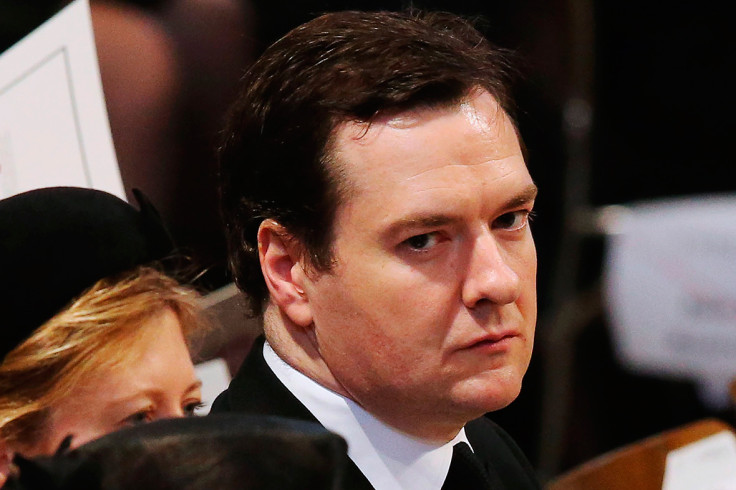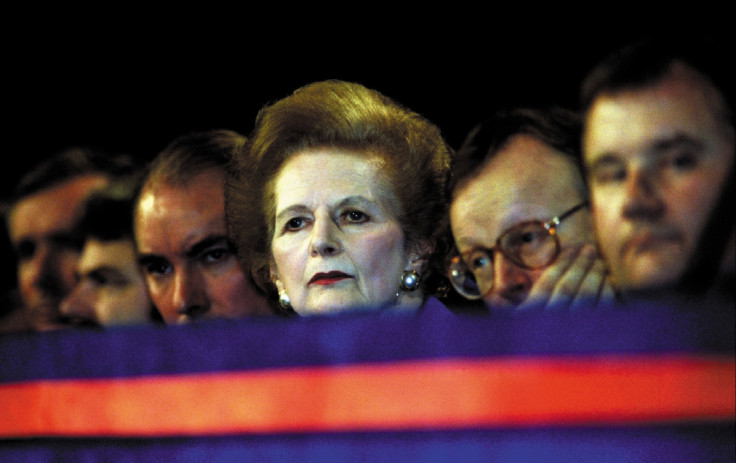Summer budget 2015: Libertarians mourn as Tory chancellor George Osborne buries Thatcherism

George Osborne's biggest critics on the left accuse him of being an anti-state ideologue. That he wants to hack it and all its supposed gems – welfare and the NHS, for example – to pieces, flogging the best bits off as scrap to the private sector.
But his credentials as a small-state champion have taken a bit of a dent in the eyes of the libertarians after the chancellor delivered a budget that included the biggest political interference in wages Britain has ever seen. And for the man who shed a tear for Margaret Thatcher at her funeral in 2013, it could be argued Osborne's announcement signals a farewell to Thatcherism.
In a move that raised the spectre of the wages councils of the 20<sup>th century, Osborne will introduce a compulsory National Living Wage (NLW) for over-25s that will hit £9 by 2020. It had the Conservative work and pensions secretary Iain Duncan Smith literally punching the air with his fists and shouting "fantastic". This from a man who in 1993 was warning parliament that a minimum wage "means job losses".
Indeed, deputy editor of the Telegraph Allister Heath, in a piece that began "Goodbye Thatcherism", claimed Osborne had had an epiphanous "Clause Four" moment.
He is of the political Right, but isn't a genuine free-marketeer; a partial, necessarily imperfect analogy would be to describe his views on domestic matters as those of a modern, 21st‑century Harold Macmillan
He sighed: "[He] clearly relishes outfoxing Labour, but this is not just about politics: Mr Osborne's beliefs are consistent with a philosophical tradition that has held sway in the Tory party for most of the past 65 years, with the crucial exception of the Eighties and early Nineties.
"He is of the political Right, but isn't a genuine free-marketeer; a partial, necessarily imperfect analogy would be to describe his views on domestic matters as those of a modern, 21st‑century Harold Macmillan."
Two libertarian think tanks described the new NLW as a "disaster" and "intellectually bankrupt" for its potential effects on employment. The independent fiscal watchdog, the Office for Budget Responsibility (OBR), predicts employment to be 60,000 lower as a result. It estimates the added cost of NLW will amount to just over 1% of corporate profits by 2020.
"In many respects, Wednesday's budget was the chancellor's most right-wing yet, slashing welfare and boosting defence spending," wrote Heath.
"Yet in other ways, it was his most left‑wing, declaring war on landlords, raiding dividends and embracing a minimum wage increase so large that the Labour Party would never have dared to implement it."
Low Pay Commission
The NLW kicked the stall from beneath the feet of the Labour Party, which has been championing higher pay for workers and accusing the government of making people worse off. It was a smart political move even if there are catches, such as the slashes to tax credits that will make low earners worse off anyway.
But it also makes the Low Pay Commission (LPC) redundant. When the minimum wage was introduced in 1998, the government set up the LPC, an independent advisory body, to assess how much it should increase each year.
This was to remove the politics from setting the minimum wage so it would be set at a level the market could cope with without causing the loss of jobs or stymie the creation of new ones, as evidence suggests arbitrarily increasing it does.

"The new National Living Wage is a disaster that will condemn tens of thousands of people to long-term unemployment," Sam Bowman, deputy-director of the libertarian Adam Smith Institute think tank.
"Almost all of the most methodologically robust, academic studies indicate that increases in the minimum wage kill jobs. Low-skilled people, young people and ethnic minorities are the ones who are hit worst."
The new National Living Wage is a disaster that will condemn tens of thousands of people to long-term unemployment
Bowman said the UK had had a "benign" experience of the minimum wage because of the LPC's work to set it at a level that minimises job losses.
"It has done this admirably, restraining hikes like this. This can no longer be the case," he said.
"There is no magic wand we can wave to make workers more productive. Raising the National Insurance threshold for low-income workers would have given them more take-home pay and created jobs.
"But that would have required spending cuts or tax rises elsewhere, so the chancellor has taken the politically easy way out. If the Office for Budget Responsibility estimates are to be believed, today the chancellor will have put 60,000 people out of work."
'Intellectually bankrupt'
Osborne, who said in his budget that Britain deserves a pay rise, argues he will offset this additional cost for businesses by cutting taxes for them. It will trim corporation tax further, eventually to 18%, and reduce the National Insurance contributions firms have to make for their employees.
"[The NLW] will mean a direct boost in earnings for 2.7 million low-wage workers, and the OBR have indicated that knock-on effects further up the wage distribution could mean a further 3.25 million people also see an increase in wages as a result of the NLW," said the Treasury's budget document.
"By the end of the parliament, an individual aged over 25 working 35 hours a week and previously earning the NMW will see their gross wages increase by around a third compared to 2015-16, or £5,200 in cash terms. This is equivalent to an extra £2,000 per year from the premium alone, £4,000 for a couple."
Mark Littlewood, director general at the Institute of Economic Affairs (IEA) think tank, called Osborne's living wage policy "intellectually bankrupt".
"Almost a fifth of workers will now see their hourly rate of pay determined by a government quango. The reform is based on the idea that tax credits currently subsidise employers. There is scant evidence for this," he said.
"The government has changed the remit of the Low Pay Commission to target inequality rather than set a wage floor. The commission should be renamed accordingly.
"The ease with which the chancellor glossed over the problems which will be faced by more than 60,000 people in seeking gainful employment was frightening. These are often the most low skilled and vulnerable in society.
"The new name for this wage setting policy will mean that changes to the rate will always be judged against the Living Wage campaign. Instead of companies setting wages according to work done by their employees, they will now face increased pressure to compensate workers for high rents and high energy costs often driven by misguided government policies."
'Arithmetically impossible'
Those on the left are angry about the NLW for different reasons – they see it as a con. Osborne also unveiled a wave of new cuts to tax credits, which his critics say will offset any boost to incomes from the new living wage, as well as a freeze on many benefits rises.
"As for a higher wage country: well the only sure way of achieving that is to raise productivity," Paul Johnson, director of the IFS think tank, said in his post-budget analysis.
As for a higher wage country: well the only sure way of achieving that is to raise productivity
"We still await details of how that is to be tackled. Simply forcing wage increases by government fiat by hiking the minimum wage is more of a gamble."
Johnson also said the "the increase in the minimum wage simply cannot provide full compensation for the majority of losses that will be experienced by tax credit recipients".
He added: "That is just arithmetically impossible. The gross increase in employment income from the higher minimum wage is about £4bn. Welfare spending as a whole is due to fall by £12bn and, even excluding the effects of the four-year freeze tax credit spending is due to be cut by getting on for £6bn.
"And of course many of the recipients of the higher minimum wage will not be tax credit recipients. Unequivocally, tax credit recipients in work will be made worse off by the measures in the budget on average."

© Copyright IBTimes 2025. All rights reserved.






















